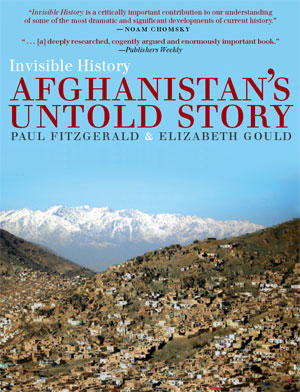Elizabeth Gould and Paul Fitzgerald on Afghanistan's Invisible History
Topics:
*The Durand Line, created in 1893 by India's Foreign Secretary, Sir Mortimer Durand.
*Former Afghan leader, Mohammed Daoud, and his difficulties with US anti-communist figures who thought he might be 'turning lefty'.
*Former National Security Advisor Henry Kissinger, under Nixon, and former National Security Advisor, Zbigniew Brzezinski, under Carter.
*The introduction to 'Invisible History' was written by human rights expert Sima Wali. She wrote about the important roles Afghan women held prior to the late 1970s when she fled the country. Gould and Fitzgerald discuss the Afghanistan they saw, the one Sima Wali grew up in, versus the one US policies helped create under several different US administrations extending from Nixon through George H. W. Bush and George W. Bush.
TRT: 29:19
Produced by Dori Smith, Talk Nation Radio studios, Storrs, CT
Syndicated with Pacifica Network
Download at: Pacifica's Audioport here or at Radio4all.net and Archive.org in various formats for broadcast, podcast.
Elizabeth Gould and Paul Fitzgerald join us to talk about their book, 'Invisible History, Afghanistan's Untold Story'. This book tells the real story behind the propaganda. (City Lights books, San Francisco). Their blog is Invisible History.
 After the Soviet Union invaded Afghanistan in 1979, all Western media was expelled. But in 1981, Elizabeth Gould and Paul Fitzgerald became the first US journalists to gain entry into Afghanistan. Their book has been praised by many US scholars including Chalmers Johnson and Noam Chomsky. Amazon.
After the Soviet Union invaded Afghanistan in 1979, all Western media was expelled. But in 1981, Elizabeth Gould and Paul Fitzgerald became the first US journalists to gain entry into Afghanistan. Their book has been praised by many US scholars including Chalmers Johnson and Noam Chomsky. Amazon.Elizabeth Gould and Paul Fitzgerald return next week when we hear more on how the US resorted to support for war lords like Gulbuddin Hekmatyar, CIA support for feudal landlords and Muslim fundamentalists. What were some of the consequences of long standing CIA efforts to expand the influence of the extremist Wahhabist tribe of Al Saud ..and Al Qaeda?
The Afghan people have suffered tremendously as one empire builder after the next took their shot at domination. As we hear from Gould and Fitzgerald, they resist that domination and they keep trying to achieve a more independent nation. (See Amnesty International report here.)
We will spend the next few programs looking at Afghanistan, as conditions are being prepared on the ground in Helmand Province and other parts of the country for elections scheduled for August 20th. The US press has been documenting the increase of US forces in Afghanistan, but little has been said about the impact of US involvement since WWII, on this land known as 'the graveyard of empires.'
Links on the election: Foreign Policy Journal, Inter Press Service, Huffington Post, Times Online,Tikkun Magazine,Atlantic Free Press, Agence France Press,Empire Notes,Global Security,Global Policy Forum, Global Research.ca send us your thoughts on what other sources we should use to understand Afghanistan at talknationradio@gmail.com.
Next time we will hear their thoughts on what the Obama White House can do to improve US policy toward Afghanistan. Should the US withdraw forces? They say de-militarization of US policy in Afghanistan is the answer.
This day in news on Afghanistan:
Helmand Province: Washington Post,
By Alfred de Montesquiou, Associated Press, Thursday, August 13, 2009
NPR Morning Edition: The lead to this interview with Maj. Gen. Michael T. Flynn was that the US Military are trying to better understand the Afghan people. The Major General tells Renee Montagne. "The surrounding districts around the city ... the Taliban feels pretty comfortable there right now." He also expresses some frustration about the fact that they cannot easily tell an Afghan civilian from a member of the Taliban..by what they are wearing.)
UK Courts try Afghanistan War Resister: Soldier in court accused of desertion
Press Association, 'An expert witness on the lawfulness of war in Afghanistan could be called to give evidence at the court martial of a soldier who refused to fight'.
'Lance Corporal Joe Glenton, 27, from the Royal Logistic Corps, faces one charge of desertion for refusing to return to Afghanistan.'
No comments:
Post a Comment